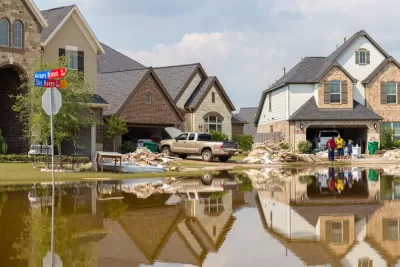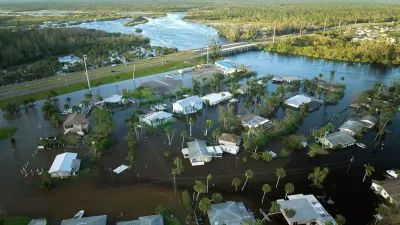Coming off a year of historically catastrophic extreme weather, the Federal Emergency Management Agency has decided to avoid using the "double C word."

Umair Irfan reports that the Federal Emergency Management Agency's strategic plan for the years 2018 to 2022 does not include any reference to climate change.
The strategic plan instead uses tortured semantics while projecting more frequent and more expensive disasters in the coning years. "Disaster costs are expected to continue to increase due to rising natural hazard risk, decaying critical infrastructure, and economic pressures that limit investments in risk resilience,” according to the document."
Irfan places the decision to elide climate change from FEMA's strategic plan in the context of the megadisasters of 2017. Irfain says hurricanes, heat waves, wildfires, and tornadoe cost "at least" $306 billion in 2017.
The move is the latest Trump Administration controversy to follow from perhaps troubling choices of words. The FEMA strategic plan news follows shortly after news that the Department of Housing and Urban Development was planning to remove references to discrimination in its mission statement.
FULL STORY: FEMA is preparing for the future. “Climate change” isn’t part of it.

Planetizen Federal Action Tracker
A weekly monitor of how Trump’s orders and actions are impacting planners and planning in America.

Maui's Vacation Rental Debate Turns Ugly
Verbal attacks, misinformation campaigns and fistfights plague a high-stakes debate to convert thousands of vacation rentals into long-term housing.

San Francisco Suspends Traffic Calming Amidst Record Deaths
Citing “a challenging fiscal landscape,” the city will cease the program on the heels of 42 traffic deaths, including 24 pedestrians.

Amtrak Rolls Out New Orleans to Alabama “Mardi Gras” Train
The new service will operate morning and evening departures between Mobile and New Orleans.

The Subversive Car-Free Guide to Trump's Great American Road Trip
Car-free ways to access Chicagoland’s best tourist attractions.

San Antonio and Austin are Fusing Into one Massive Megaregion
The region spanning the two central Texas cities is growing fast, posing challenges for local infrastructure and water supplies.
Urban Design for Planners 1: Software Tools
This six-course series explores essential urban design concepts using open source software and equips planners with the tools they need to participate fully in the urban design process.
Planning for Universal Design
Learn the tools for implementing Universal Design in planning regulations.
Heyer Gruel & Associates PA
JM Goldson LLC
Custer County Colorado
City of Camden Redevelopment Agency
City of Astoria
Transportation Research & Education Center (TREC) at Portland State University
Jefferson Parish Government
Camden Redevelopment Agency
City of Claremont





























